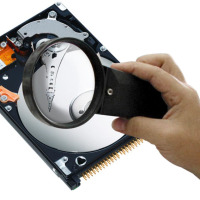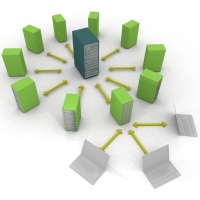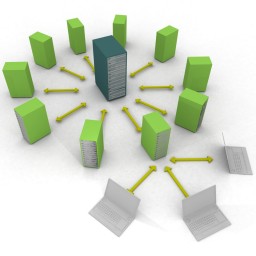Network security is a crucial to all networks, but some people do not know truly know how important this concept is. There are a variety of threats and reasons why people should know about network security threats.
Category: Security
Security is an important topic when it comes to technology. There are many different areas of security, so this category is divided into various sub-categories to help navigate through the posts on security.
-

Staying Safe By Understanding Desktop Security
If you are just getting started with the use of a home computer, you have no doubt heard of the various types of malicious software that can be used to infiltrate your system. This type of unwanted programming is commonly known as malware, and is used by unscrupulous individuals trying to gain access to information stored on your computer, mostly for the purpose of sending you bothersome amounts of advertising. In other cases however, it can be an attempt to steal your personal information. Desktop security is therefore a priority.
Exactly What Is Malware?

Malware is an abbreviated version of “malicious software”, and refers to such infectious programs as spyware, adware, tracking cookies, and computer viruses. Spyware is used to record your internet connections activity and can actually direct your web connection to another computer without your knowledge. Tracking cookies record your web browsing history and can be used to put you on ridiculous e-mail lists, resulting in a large volume of incoming spam. Viruses can introduce keylogger commands that record every keystroke you make, including the entering of passwords and credit card numbers. They can also freeze your system after commanding your computer to upload your documents to another system.
Antivirus Programming Is Important
If you purchase your computer in new condition from a retailer, it will often come with a subscription or free trial offered by a computer security company. These subscriptions allow you to run security scans on a schedule and personalize other settings that check for various types of malware. These companies regularly update their information concerning new viruses and other forms of malware, and relay that information to your computer so that it is constantly protected. If your computer purchase does not include an antivirus subscription for desktop security, then it is highly suggested that you purchase one, either from a retailer, or in a downloadable form from an internet security company website.
Other Security Measures You Can Take
There are a few simple routines you can take to help with desktop security, and these should be done in addition to having an antivirus program installed. Most internet browsers have a special window that you can open up for the purpose of deleting your browsing history or removing all tracking cookies. You can also enable a firewall that will not allow a hacker to transfer your information to his/her computer. Most browsers also contain an optional popup blocker. Popups are usually filled with tracking cookies, as these advertisements are meant to install programming on your computer even if you do not buy anything.
There’s no need to panic of feel insecure while online. Having an antivirus program coupled with your own maintenance regimen will go a long way towards keeping your computer safe.
-

Mozy is Changing Their Pricing – Possibly Making it Unaffordable
I have been using Mozy for backing up my data for a few years now. I haven’t had any issues with their service, and the ability to automatically backup my data makes it very easy to keep my data safe. In addition to the online backup, the local backup has also made it even easier to backup my data to two locations at one time.
This week, however; Mozy has decided to do away with their unlimited plan in favour of plans that will provide you with a base amount of storage, and then charge you for additional storage. While I can see why they would change to this model, it unfortunately won’t work well for me.
-

Do Not Lose Your Data – Learn How to Recover Hard Drive Files
Sooner or later, each one of us will accidentally delete a file. Sometimes the recovery process is simple. Other times the process used to recover hard drive files can be extremely technical. In these few words, I am going to take you from the simple to the complex.
-

Don’t Lose Your Data: Create a Disaster Recovery Strategy
Anyone who is in charge of managing their own data or someone else’s data should have a disaster recovery strategy in place in case anything ever happens to the site where their data is stored. By creating a good strategy, you can ensure that your data is never lost and you can even avoid spending excessive amounts of money on forensic data recovery.
Many people fail to properly back up their data, whether it’s at work or at home. This is your first line of defense against losing your data and you should back up your data at least once a day or once a week, such as using a storage server. When backing up your data onsite, start by purchasing two external backup drives that have a large enough capacity to store everything that is on your hard drive. At least one of these drives should be both waterproof and fireproof. It will also help if it is somewhat shock resistant. By having a hard drive that can survive the elements, it can become a key storage device for your disaster recovery strategy.
-

The Importance Of Small Business Backups
Small businesses should not be out of the loop in concerns to business backups. This is not a task that is reserved for large organizations alone. Small companies also need to make efforts to develop small business backup plans.
Most operating systems are equipped with tools that will allow small business owners to backup files for free. The software is typically found in the system tools section of most operating systems for Windows users. There are other operating systems, however, that may require users to purchase software that can be used to backup files on a regular basis.
(more…) -

Keep Your Network Safe with a Proxy Firewall
A proxy firewall, otherwise known as a network/proxy server firewall or simply ‘firewall’, is a virtual security appliance that runs on a host computer or server machine and works at the application level. A proxy firewall is a form of packet filtering device, whereby both outgoing and incoming packets (usually in an organization’s intranet) are examined, as well as a “go-between” for users on different networks. A specific set of rules governs which type of packets–based on such items as IP address, source address, destination address–are allowed to enter and exit a private network, such as a LAN or corporate intranet.
Proxy Firewalls Keep Intruders at Bay and Employees In-Check

A proxy firewall typically resides on a single, private IP address that’s distinct from the rest of the hosts on the internal side of the firewall. This masks hosts’ true IP addresses, which are typically very similar and share at least two or three octets (number sets in an IP address: there are four in all).
A distinction should be made between ‘proxy firewall’ and ‘proxy server’. Proxy servers are typically physical machines; one of their functions is act to as a centralized storage machine, whereby multiple users in a small network connect to it and retrieve “cached” copies of files–reducing the load/bandwidth on the network and increasing network efficiency. Proxy servers can also serve as a sort of storage depot for public internet users, especially customers of e-commerce websites.
A proxy firewall, in contrast, is software or an application that primary serves as a security barrier between the outside internet and a private network or internal intranet. Proxy firewalls, however, can and do run on proxy servers. SOCKS must be enabled on both machines tunneling through a proxy, but nearly all modern computers already have this capability.
How it Works
While the specific details go far beyond the scope of this article, the fundamentals of how proxy firewalls operate are pretty simple. A proxy–which is kind of intermediary device in the technological sense–enables clients to establish communicate with other clients (or hosts machines, or servers) without actually making a direct connection. When a user sends a request to another user through a proxy server’s firewall, he/she connects directly to the proxy. The proxy, in turn, requests a connection from the destination address, and the flow of information between hosts is initiated. Through a series of “SYN-ACK” (send/acknowledge) requests, communicate takes place without either host on either side of the firewall ever being connected to one another.
Why communicate like this? Security. As the internet has grown over the last couple of decades, so has the number and amount of people and malicious code circulating. Installing a proxy firewall on a host or server is considered a more basic form of security for organizations, though, and should not be used as a do-all security device. Through layering–adding multiple ‘layers’ of security to a network–network security is hardened.
-

Do You Think About Your Home’s Internal Network Security?
Home networks are quite common in many of today’s households. These days, it’s actually quite the norm for the average family to have networking equipment in their home. Having a network in the home makes it a lot easier for computers and other devices to communicate with each other as well as share an internet connection. Yes, home networks provide extremely helpful features to computers, but lots of people forget that internal network security is a big issue with these networks. Many don’t know exactly how to secure their network, and there are many that don’t even take it into consideration.
Internal network security is imperative for a number of reasons. It’s important to secure your home network so that you can keep outside intruders from accessing your network and files, minimize threats like viruses and spyware, and more. For example, if you were to leave your home network unsecured, an intruder could easily access the network and do something like change your login information for you router so that he/she could gain complete control over the device. Even worse, he/she could access confidential files that you wouldn’t want the public tampering with.
(more…)